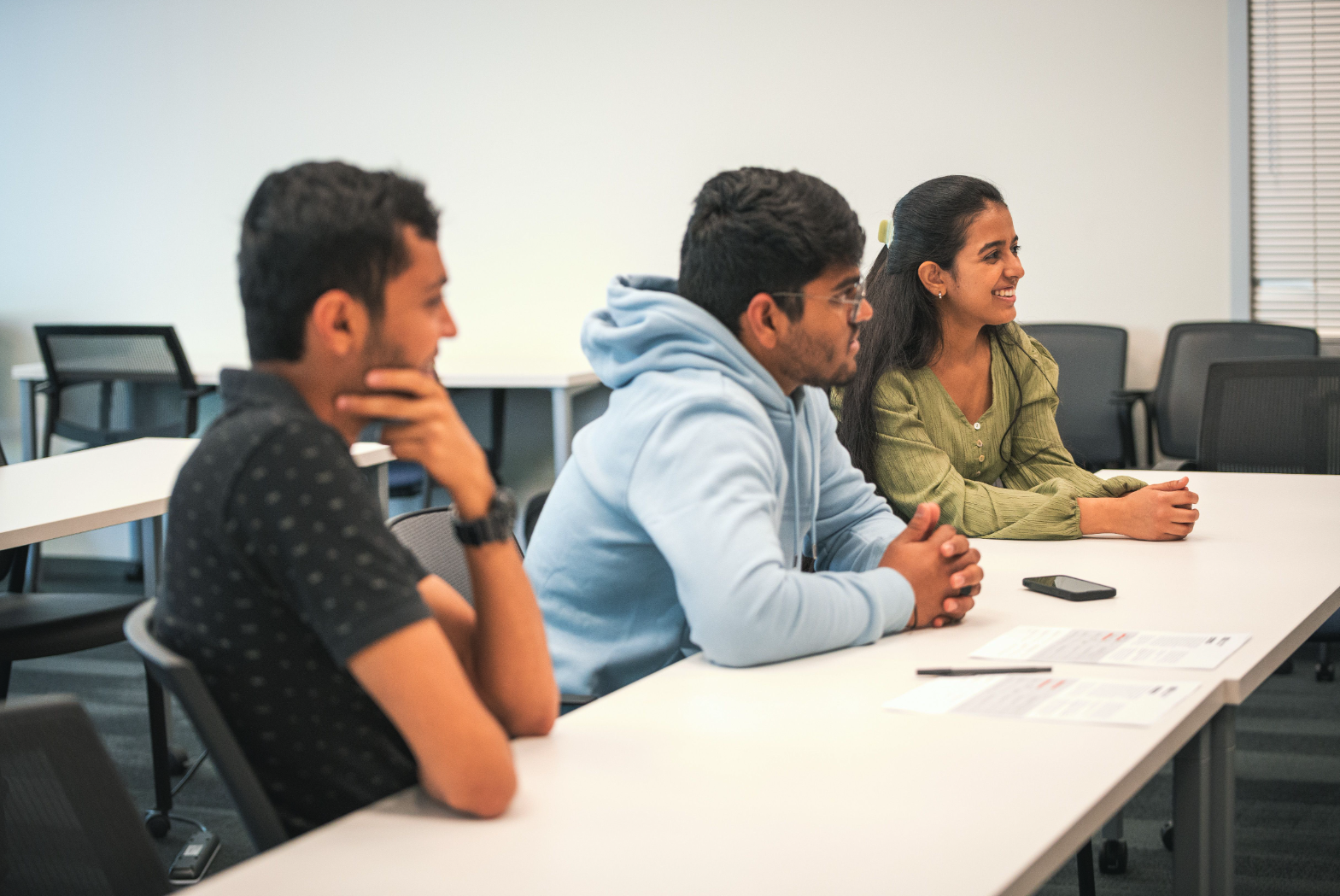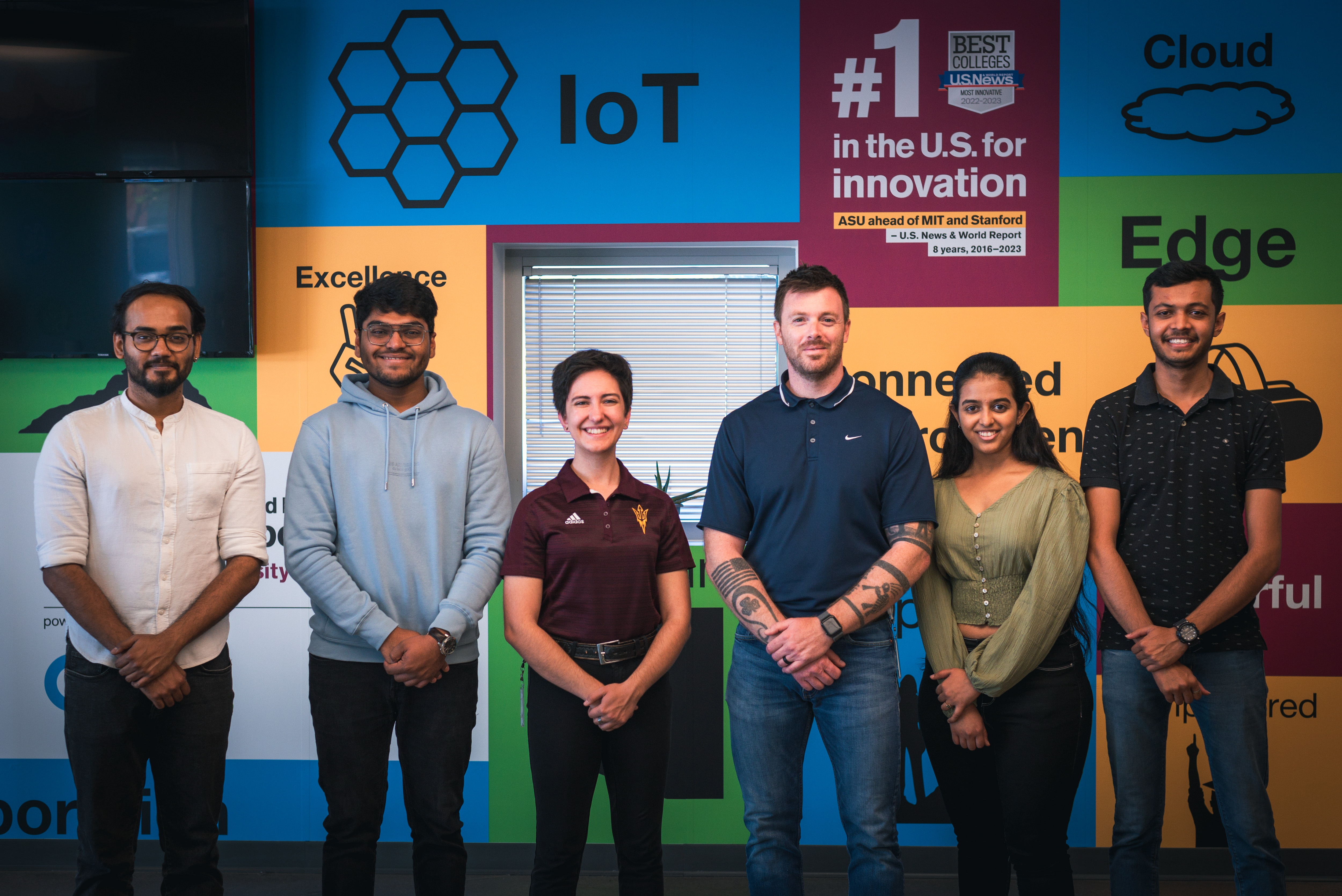
Cox Connected Environments Collaboratory student workers Harsh Patel, Darsh Bhimani and Astha Hemal Shah engaged in conversation at the Collaboratory.
As ASU students prepare for the end of the semester, it’s valuable to think about all that they’ve accomplished — in and outside of the classroom. For four student workers at the Cox Connected Environments Collaboratory, their learnings this semester have better prepared them for jobs in the future, and even helped to shift their academic interests.
The student interns include:
- Darsh Bhimani, Graduate Student, Information Systems Management, W.P. Carey School of Business
- Abhigyan Singh, Graduate Student, Information Systems Management, W.P. Carey School of Business
- Astha Hemal Shah, Graduate Student, Information Technology, Ira A. Fulton School of Engineering
- Harsh Patel, Graduate Student, Construction Management and Technology, Ira A. Fulton School of Engineering
This spring, the students were divided amongst two key projects for the Collaboratory, including researching major technology trends and exploring new ways in which the Collaboratory can live out its mission of bringing smart technology into the ASU community and beyond. We recently caught up with the students as they reflected on their semester at the Collaboratory.
How has your experience at the Collaboratory built on what you’ve been learning in your classwork?
Darsh: People say that classroom knowledge is more about learning from books and presentation, and when you work for a corporation, you learn how things work. That’s what my experience has been working in the Cox Collaboratory. It’s like working at a startup — you’re trying to figure out things at a micro level and building with a step-by-step process. The Collaboratory has given me an opportunity to look at things at a micro level and the importance of taking one step at a time to grow. This is something I was hoping to get experience on.
Abhigyan: Before coming to ASU, I previously worked as a Product Manager. I have the experience, I have the new classroom knowledge, and I’m trying to upskill and improve in these same areas. This is the best place to use the knowledge that I’ve gained in lectures and classes while learning the work culture.
What new skills, techniques, and knowledge have you gained during your time at the Collaboratory?
Astha: I’ve learned how to learn. At first, if I had a question, I’d google it, find the answer, and be happy with that. Now, I know there should be more to the answer. While working at the Collaboratory, we research many different websites and resources to get an answer to things — this has helped me a lot in my classes.
At the Collaboratory, we’re researching the different technologies that are trending right now, and I came across cloud computing. I’ve read about it before, but this time, we have dived deep into it. It interests me so much that I will be taking two cloud computing courses next semester.
Harsh: I’m not a technologist, and this experience has exposed me to so many new technologies that I didn’t know. I learned how to better manage a project when starting from scratch, how to keep track of all projects and how to communicate within a team.
How will you apply what you’ve learned?
Darsh: At the Collaboratory, we have one-on-one sessions in which we talk about projects going on — it’s unfiltered conversation to talk about things, including what you’re not comfortable with. This is something that I’m going to implement in my work life.
Another thing I’ve learned is that if you hit a wall a hundred times, remember that you just need to break through that wall one time. Keep going and do it. Try different things, think outside the box and try different directions. Get comfortable that it might not work the first time, but you are looking for that one time it will work.
Abhigyan: My parents asked me how I’ve changed so much [while being at ASU and the Collaboratory]. I told them: life and mentors!
It is nice because everyone is applying what they’ve learned. I was working on a project early in my position in which we were searching for different domains, and it taught me so many things:
- How to find the information requested for your supervisor.
- How to translate that research into an end product.
- How to give the best deliverable that is being asked of me.
What is the most rewarding thing about your experience at the Collaboratory?
Abhigyan: I’ve learned a lot of people through the Collaboratory, which is helping me to strengthen my network. It’s been an important thing.
Harsh: Yes, that’s really great. I’ve also expanded my network working at the Collaboratory.
Astha: The most rewarding things have been that you learn every day, you learn the importance of communication, networking and consistency.
Darsh: I’ve learned the importance of asking good questions.
Darsh and Abhigyan will be able to apply their work experience soon — both student workers will graduate with their Masters from ASU in July 2023.

Cox Collaboratory student interns with staff members Rachel Hayden and Curtis Buschor (featured center).
Learning goes both ways
The ASU students aren’t the only ones to gain from their time at the Collaboratory. The team at the Cox Collaboratory has also learned from the students and from collaborating with them throughout the semester. “We’re so fortunate to have these four teammates added over the last several months,” said Curtis Buschor, Project Manager of the Collaboratory. “I’ve been a part of onboarding a lot of people in various careers, and it’s remarkable to have these people — who all have different skill sets and different personalities, but all are such a great fit to what we’re trying to build here at the Collaboratory. They are all so talented but aren’t afraid to ask tough questions and to challenge where we’re going. When you have a lot of new territory in front of you, it’s great to have various perspectives that they’ve been able to provide us.”